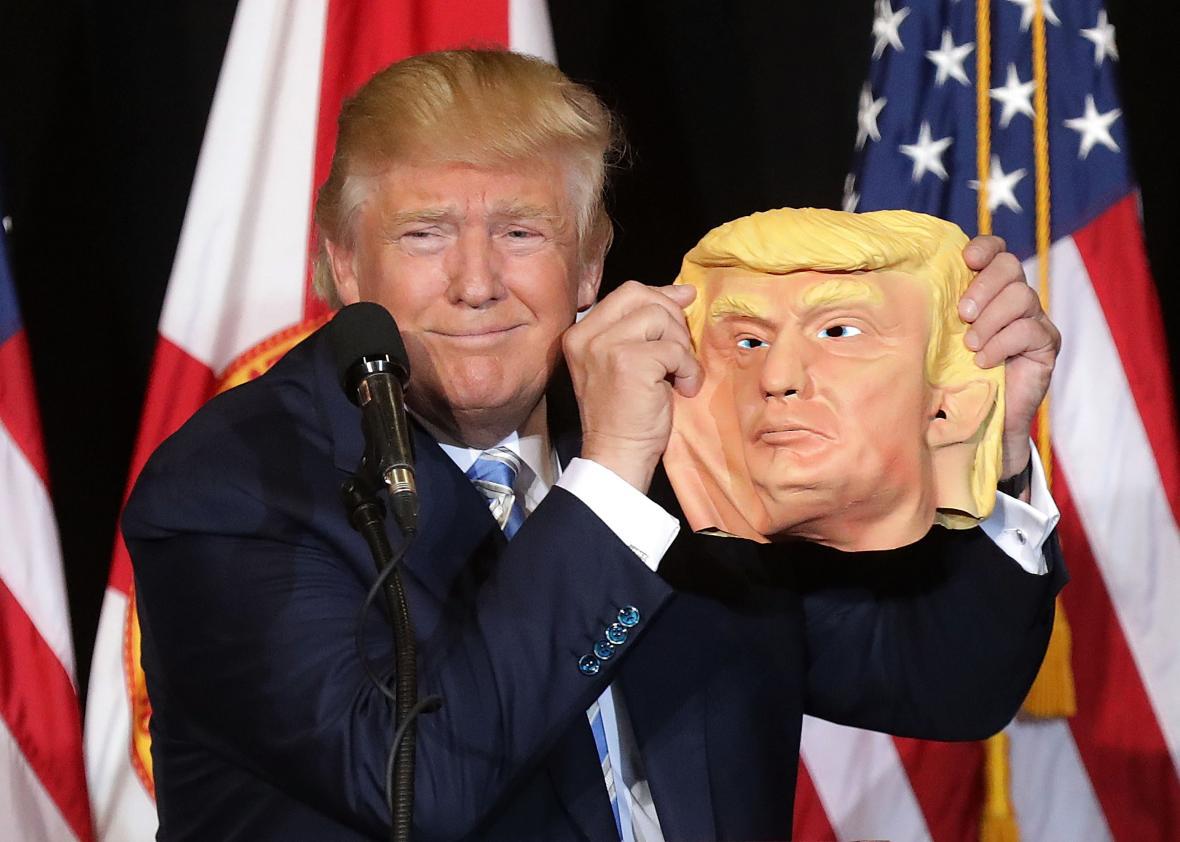Election stress has conceded to post-election stress. To deal with our new reality under President-elect Trump, many of us are “stress-eating” ice cream or seeking “workout therapy” at the gym. Wordplay, it seems on social media, is emerging as one of America’s coping mechanisms, and we’re getting through the election results with two words in particular: stress and therapy.
Life after Trump is putting stress in front of every verb you do. We are “stress-watching” TV, “stress-listening” to music, “stress-playing” guitar, “stress-reading” novels, “stress-exercising,” “stress-drinking,” “stress-texting,” “stress-cleaning,” and even having “stress-sex.” One tweeter stress-joked: “I feel like I’m carrying around a giant weight today. Mostly because of election results, partially from binge stress eating.” So many of us are “stress-living” now, as one user pointed out on Twitter. What’s going on with this stress- construction?
These stress- words are a special type of word formation linguists call synthetic compounding, which can function in several ways. Here, stress- is characterizing the purpose of the verb: Stress-eating, for instance, is a type of food consumption in response to stress. (Compare stress-jogging, say, to stress-relieving or stress-testing.) Speakers, liking economy, shortened the name of this behavior to stress-eating and then, in a process known as back-formation, rendered it a verb, stress-eat, to use more easily across other contexts.
Stress-eating is an important, if not key, example of these synthetic stress- compounds, as it appears to have parented all its derivatives. Self-help literature has employed stress-eating (a type of emotional eating) since at least 1997. And currently, if corpus searches are any measure, stress-eating is the only stress- construction with any real currency, the innovations on social media yet to spread. We’ll just have to see if Trump makes stress- great again.
Stress-eating, in form and function, also nods to binge-eating, which was first used in psychiatric journals in 1959 and subsequently influenced the now-pervasive binge-watching. Millions of Americans struggle with eating disorders and compulsive behavior, to be sure, but the rise of stress- and binge- compounds also joins a broader trend of compounds in recent English. We hate-watch The Bachelorette. We people-watch at the mall. We relationship-build at business conferences. We gay-marry and conceal-carry. And before we stress-ate the Nov. 8 outcome away, we early-voted.
While many of us are stress-handling the election, others are seeking out therapy. New York artist Matthew Chavez, notably, organized “Subway Therapy,” in which riders colorfully papered a subway passageway with personal messages written on sticky notes. People have covered Twitter, too, with their own therapies. To manage election-related anxiety, users have sought out “radio therapy,” “poetry therapy,” “coloring therapy,” “puppy therapy,” and, putting a positive spin on their stress- counterparts, “TV therapy” and “food therapy,” including “wine” and “hot chocolate” varietals.
The linguistics of these therapy phrases is fairly straightforward. The various nouns preceding therapy, called attributive nouns or noun adjuncts, act as modifiers. English abounds in these compounds, like school bus, and they frequently become so common we treat them as a single word over time, e.g., lunchbox. Therapy also abounds in these compounds. Consider shock therapy, group therapy, art therapy, and music therapy. In these terms, unlike psychotherapy or gene therapy, the attributive noun labels the therapeutic method.
Shock therapy, group therapy, art therapy, and music therapy also all entered the language in the first half of the 20th century. The form, and practice, of noun + therapy had apparently become familiar enough to inspire the flippant retail therapy by the 1980s. In recent years, people have especially played with TV therapy. Facebook hosts a few pages known as “TV Therapy,” which unwind all the nostalgia, trivia, and minutia of popular television. On Twitter, users like to cite specific shows that help them relax, from the lighter escapism of “Seinfeld therapy” and “Parks and Rec therapy” to the darker decompression of “Walking Dead therapy” and “Game of Thrones therapy.” As one user announced: “President….Trump?! I need some Gilmore Girls therapy asap!”
Post-election stress and therapy constructions are very much a part, and product, of our current political and linguistic zeitgeist. But they also underscore how extensive our psychological literacy has become in our current moment. Psychological therapy, as we saw, only takes off as a term at the start of 20th century, while stress isn’t used in the psychological sense until 1955. Now, we casually riff on these once-technical terms in our one-off status updates.
Politics aside, constructions like stress-cleaning and Gilmore Girls therapy in our informal language suggest we have a greater understanding of the psychological reasons for many of our feelings and behaviors—and are painfully, and playfully, aware of high levels of stress and anxiety in our everyday lives, including the importance of managing it. But stress-cleaning and Gilmore Girls therapy, for all the release and escape they can provide, may not be the most adaptive coping strategies for those of us fearful of Trump’s America. That would be taking action.
